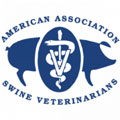 Swine veterinarians play an essential role in providing services to ensure the health and welfare of swine. We also play a critical role in promoting and protecting public health. Every day, swine veterinarians ensure a safe and secure food supply, conduct surveillance for emerging and zoonotic diseases, and promote responsible use of antibiotics.
Swine veterinarians play an essential role in providing services to ensure the health and welfare of swine. We also play a critical role in promoting and protecting public health. Every day, swine veterinarians ensure a safe and secure food supply, conduct surveillance for emerging and zoonotic diseases, and promote responsible use of antibiotics.
The world is experiencing and responding to a pandemic of respiratory disease spreading person-to-person. SARS-CoV-2 (severe acute respiratory syndrome coronavirus 2), which causes COVID-19 (coronavirus disease 2019), is a serious public health threat.

Although there is no scientific evidence this viral outbreak is related to pigs or pork, the control measures designed to slow the spread of SARS-CoV-2 are impacting our practices, communities, clients, and families.
The American Association of Swine Veterinarians recommends the following for swine veterinarians and their clients:
- Practice good hygiene. Wash your hands frequently with soap and water for at least 20 seconds. Avoid touching your face. Cover coughs and sneezes with a tissue.
- Stay home if you are sick. Your clients should inform all employees to not come to work if they are feeling unwell. Management on farms should routinely look for ill employees and immediately send them home. Maintain flexible leave policies and make sure all employees know they need to stay home if they are ill.
- Avoid close contact and practice social distancing when possible. If you or your staff are able, work remotely. Maintain at least 6 feet between contacts.
- Clean and disinfect frequently touched surfaces daily.
- Practice strict biosecurity at all production sites. Visitors not necessary for the operation of the business should not be allowed onto the premises.
- Do not hoard supplies. The American Veterinary Medical Association (AVMA) has received some reports of limited ordering for some medical supplies (e.g., masks, gloves). Hoarding of supplies or bulk purchasing in anticipation of a shortage is not recommended as it could create artificial product supply issues.
- Conserve personal protective equipment (PPE). Some states are asking veterinarians to donate or sell any excess PPE to state health departments. Many states have urged veterinarians to delay any elective procedures. Veterinarians are being asked to limit elective procedures to decrease social interaction and decrease the use of supplies, such as gowns, gloves, and masks that are also used in human medicine and critical for patient care and responder protection during this outbreak. Swine veterinarians should conserve PPE when possible.
- Develop and maintain farm and business emergency plans. Both veterinarians and producers should have plans and protocols in place in the event of staff shortages. Talk with your clients about the major job roles on their operation and assist with any cross-training where applicable. Clients should have a plan for continuity of necessary job functions critical for animal health and well-being in the event employees self-isolate or are quarantined.
- Prioritize your health and well-being. Consider your own, your employees’ and your clients’ mental health and well-being. The agriculture economy and stress of being a veterinarian can be exacerbated during this uncertain time. Ask your clients and employees how they are doing. Take care of yourself. If you are experiencing a mental health crisis, we encourage you to reach out to resources in your community, colleagues, online, or at the AASV well-being page. Add the Suicide Prevention Hotline (US) number, 800-273-8255, to your phone contact list today. Encourage coworkers and clients to do the same.
AASV is continuing to work with industry and public health partners to make sure you have the most important information you need to stay healthy and continue meeting a critical need in public and animal health.
March 20, 2020 - AASV



